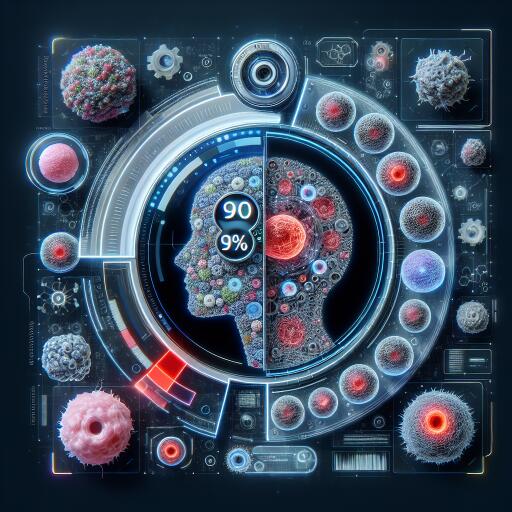Innovative AI Model Achieves 90% Accuracy in Detecting Lymphatic Cancer
In a groundbreaking study, researchers have developed an advanced artificial intelligence (AI) model capable of identifying signs of lymphoma, a type of cancer affecting the lymphatic system, with an impressive 90% accuracy rate. This significant achievement, emerging from the collaboration between Chalmers University of Technology in Sweden and several esteemed institutions, is set to revolutionize the way medical imaging is interpreted in the diagnosis and management of this challenging disease.
Revolutionizing Medical Imaging with AI
AI-assisted analysis of medical imagery is swiftly advancing, offering new horizons in accurately diagnosing and treating various conditions. The latest research conducted by Chalmers University of Technology heralds a major leap forward in detecting lymphoma. Using a deep learning system named Lars (Lymphoma Artificial Reader System), the team successfully trained a computer model to analyze over 17,000 images from more than 5,000 patients, achieving up to 90% accuracy in identifying lymphatic cancer.
Reducing the Radiologist’s Burden
AI-driven tools like Lars not only offer a second opinion to radiologists but help prioritize patient treatment, significantly easing the workload. “An AI-based system ensures all patients, regardless of their healthcare facility, receive equal access to expert analysis within a reasonable timeframe,” explains Ida Häggström, Associate Professor at Chalmers University of Technology, emphasizing the model’s potential to enhance the diagnosis of rare diseases.
The Path to a Transformative Diagnostic Tool
Developing Lars involved overcoming numerous challenges, including amassing a vast collection of imagery and refining the model to distinguish between cancerous changes and those resulting from treatment like chemotherapy or radiotherapy. Despite these hurdles, the outcome is a model that supports radiologists, especially in interpreting complex cases.
Ida Häggström describes the supervised training approach used, where the model progressively refines its diagnostic accuracy based on feedback from actual diagnosis outcomes. This self-learning capability underpins the transformative potential of AI in medical diagnostics, enabling the model to identify relevant patterns without pre-programmed instructions.
Next Steps Towards Clinical Application
While Lars exhibits remarkable diagnostic precision, further validation is essential for its adoption in clinical settings. The research team has made the computer code publicly accessible, encouraging further development based on their foundational work.
Groundbreaking Research and Collaborative Effort
The study’s findings, detailed in The Lancet Digital Health, are the result of an international collaboration, featuring contributors from Chalmers University of Technology, Memorial Sloan Kettering Cancer Center in New York, and other prestigious institutions.
For further information, Ida Häggström from Chalmers University of Technology can be contacted for insights in both English and Swedish. The university is prepared to facilitate interviews through their podcast studios and broadcasting equipment.
Conclusion
The development of the Lars AI model prominently illustrates the potential of artificial intelligence to revolutionize medical diagnostics. By achieving a high level of accuracy in detecting lymphoma from PET scans, this model offers a glimpse into a future where AI-supported diagnostic tools assist healthcare professionals in providing timely and accurate treatment plans for patients worldwide.
Note: While this article discusses a remarkable advancement in medical AI, always consult healthcare professionals for medical advice and diagnosis.










